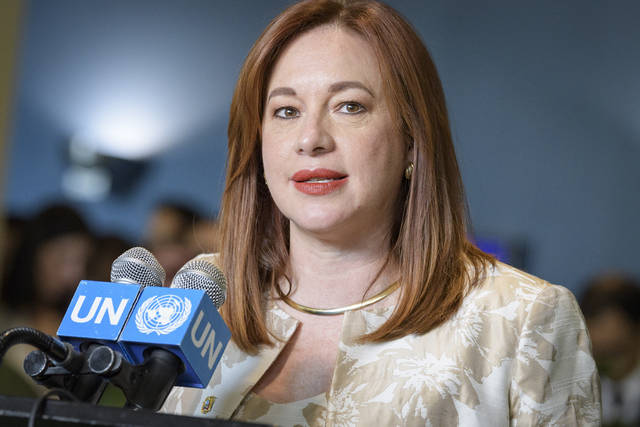UNITED NATIONS— The U.N. General Assembly on Tuesday overwhelmingly elected Ecuador’s Foreign Minister Maria Fernanda Espinosa Garces as its next president, making her only the fourth woman to lead the 193-member world body in its 73-year history.
She defeated another woman — Honduras’ U.N. Ambassador Mary Elizabeth Flores Flake — by 128-62 with two abstentions in the secret-ballot vote.
The current council president, Miroslav Lajcak of Slovakia, announced the results to loud applause, saying, “Frankly, 4 out of 73 is not a record to be proud of, but I’m glad we are getting ourselves on track.”
Secretary-General Antonio Guterres, who defeated several female candidates and continues the male domination of the U.N.’s top post, echoed Lajcak, saying, “We can and we must do better.”
Espinosa Garces expressed hope that gender parity continues to make progress and dedicated her election to “all the women in the world who participate in politics today and who face political and media attacks marked by machismo and discrimination.”
“I would like to pay a special tribute to the women who struggle every day to access jobs on equal terms, to women and girls who are victims of violence, to girls and adolescents who demand access to quality information and education,” she said. “My commitment will always be to them.”
While the presidency of the General Assembly is largely ceremonial, it is also prestigious.
The world body controls the U.N. budget, adopts treaties, addresses global issues from poverty to climate change, and passes numerous resolutions that while not legally binding almost always reflect global opinion. It is also the U.N. organ where countries large and small can speak — and the scene of the annual gathering of world leaders in September.
The selection of the assembly president follows a regional rotation mandated by the world body, and it was the turn of Latin America and the Caribbean to preside over the next yearlong session which starts just before September’s global gathering.
By tradition, the U.N.’s regional groups usually nominate a single candidate who is then rubber-stamped by the assembly. But this year the election was contested — as it was in 1991, 2012 and 2016 — according to the U.N., because Latin American countries couldn’t agree on a nominee.
Espinosa Garces noted after her victory that she will also be the first woman from Latin America and the Caribbean to preside over the assembly starting in September.
“I offered an open door presidency and I will hold to that promise,” she said.
“I am a poet as well as a politician,” Espinosa Garces said. “As such, I am fully aware that no view is useful if we do not see, and no word has any value if we do not listen. I will be ready to listen to you all and to work for you and with you.”
For the first time this year, assembly president Lajcak decided to follow a new practice that was also used to choose secretary-general Guterres.
He invited both candidates to appear before assembly members for two hours May 4 to present their vision for the presidency and answer questions from diplomats and civil society representatives. The issues raised ranged from conflict prevention and financing U.N. goals for 2030 to ending poverty and sustaining the planet to transparency in the president’s office, U.N. reforms, and gender equality.
Espinosa Garces said then that she would focus on “delivery, implementation and accountability” to bring the U.N.’s work closer to people everywhere and convince them that what the United Nations does “touches upon their daily lives.”
After Tuesday’s election, she stressed that “strengthening multilateralism is not an option, it’s an obligation.”
Therefore, Espinosa Garces said, it’s urgent that the United Nations responds to major global challenges and does more to bring the organization closer to all citizens of the world.
She told reporters later that her priorities will be to finalize negotiations for a global compact on migration, promoting action on climate change, implementing U.N. reforms, and looking for new ways to finance economic development.
Diplomats said before the vote that the views of the governments of Ecuador and Honduras would likely play a significant role in Tuesday’s voting.
One issue they pointed to that could have an impact was December’s General Assembly resolution condemning the United States for recognizing Jerusalem as Israel’s capital, which was adopted overwhelmingly.
Ecuador supported it. Honduras was one of only nine countries that supported the United States and voted against the resolution, a decision that angered the Palestinians’ many supporters. Honduras has also said it is considering following in the footsteps of the United States and moving its embassy to Jerusalem.
Espinosa Garces will join the short list of female assembly presidents that began in 1953 with Indian diplomat Vijaya Lakshmi Pandit, the sister of Prime Minister Jawaharlal Nehru and aunt of later Prime Minister Indira Gandhi. She was followed by Angie Elisabeth Brooks of Liberia in 1969, and Sheikha Haya Rashed Al Khalifa of Bahrain in 2006.
Secretary-General Guterres said that having only two women presidents in the past half-century must change.
“May today’s choice pave the way for accelerating the progress towards gender equality, within and beyond the United Nations,” he said.
———
This story has been corrected to show that the last contested assembly election was in 2016 and that the rotation of assembly presidents is mandated.


